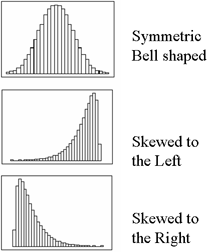For those of you who aren’t watching the Oscars (or, in fact, maybe especially for those of you who are), I send some statistics your way on a Sunday evening. It doesn’t fit with a theme and there’s no way it’s going to be as popular as the blog about marijuana arrests in New York City. (Note that like any curious person, I fully intend to test my hypothesis that writing about drugs is more popular than writing about sex. Coming soon is a blog about measuring marital infidelity, an historically slippery subject that has generated competing statistics and tends to say more about survey methods than about sexual habits.)
But for tonight, I am sending you to a surprisingly emotional essay by Stephen Jay Gould on the trouble with reducing statistics to the central tendency. Yes, I said emotional. And then I said ‘central tendency’. What, you may wonder, can get your cold hearts pumping while talking about how to measure the central tendency? In a word? Cancer. In a few more words? A life expectancy delivered in terms of a right skewed median of 8 months.
He uses his own biography to make a broader point about the general tendency to divorce the intellect from the emotions: “Many people make an unfortunate and invalid separation between heart and mind, or feeling and intellect. In some contemporary traditions, abetted by attitudes stereotypically centered on Southern California, feelings are exalted as more “real” and the only proper basis for action – if it feels good, do it – while intellect gets short shrift as a hang-up of outmoded elitism. Statistics, in this absurd dichotomy, often become the symbol of the enemy.”
logic + love = the well-lived life? These are the questions I don’t even try to answer, it’s why I do sociology, not philosophy.
Seeing Skew

Just to refresh your memory on skewness, here’s a visual reminder of what’s at stake. Refer back here when Gould talks about the many people who aren’t diagnosed with the type of cancer he had until they die, stacking the left side of the graph high with cases of life expectancy equal to zero and creating a right-skewed life expectancy.
Epilogue: Gould is no longer alive, but he didn’t die of the cancer in this essay. He lived for another 20 years and died of a different cancer at age 60.
Relevant Resources
Gould, Stephen Jay. (1985) The Median Isn’t the Message currently reposted all over the blogosphere, but originally published in Discover Magazine in 1985.
